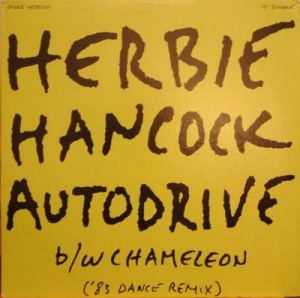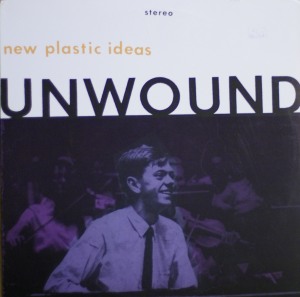46. Herbie Hancock – “Autodrive” b/w “Chameleon” - CBS, 1983

Why I Bought It: I’m primarily familiar with Herbie Hancock’s early 1970s albums Head Hunters and Thrust, which are eminently regarded, highly enjoyable jazz fusion albums with completely amazing album covers. This 12-inch single features one song from Hancock’s 1983 electro-jazz album Future Shock and a remix of “Chameleon” from Head Hunters, bridging the gap between these two eras. I’m wary of the concept of electro-jazz, especially given my discussion of dated 1980s production techniques in my last post about the Art of Noise, but it’s entirely possible that Hancock could avoid those stumbles.
Verdict: Herbie Hancock is not kidding with this electro-jazz concept. Between the sampled shouts, the constant laser gun blasts, and the tinny electronic drum kit, he’s loaded “Autodrive” with enough 1980s production clichés to make Wang Chung jealous. Sure, a grand piano makes an appearance to remind listeners of Hancock’s roots, but I can understand why “Rockit” from Future Shock was an MTV success; this song sounds like early 1980s MTV new wave. Hancock clearly has fun with these tropes, so even though the individual sounds have aged poorly, the song still has a playful, light air that almost encourages such aging. As for the flip side, I’ll have to consult the Head Hunters version to confirm this suspicion, but the remix of “Chameleon” doesn’t seem drastically different. The comparative subtlety of this track works well, since adding sampled shouts to bring an older piece up to date would have been comical instead of inspired, but it’s ultimately unlikely to steer me away from Head Hunters and toward Future Shock.
47. Unwound - New Plastic Ideas - Kill Rock Stars, 1994

Why I Bought It: I first encountered Unwound’s brand of Sonic Youth–informed punk rock with either “Dragnalus” on the soundtrack to Half-Cocked or their 1996 LP Repetition, but I’ve primarily stuck with Repetition and the relative bookends of their output (barring their self-titled debut), 1993’s abrasive Fake Train and their 2001 swansong double album Leaves Turn Inside You. Unwound’s signature aggressive detachment, honed to a cool perfection on “Corpse Pose,” pulls me in and keeps me at bay. With few exceptions—the lovely “Lady Elect,” the aching “October All Over”—my relationship with Unwound is one of respect, not affection. But including their 1998 LP Challenge for a Civilized Society in a round of iPod Chicanery underscored their almost clinical level of effectiveness when they’re on, which in the case of Challenge is about fifty percent, which opened me up to grabbing one of their other albums.
Verdict: New Plastic Ideas strikes a welcome balance between the unhinged Fake Train and the machine-like efficiency of Repetition. Although the album lacks the polish of Repetition and the explorative nerve of Leaves Turn Inside You, there’s a refreshing consistency to these nine songs their later records sacrificed in the favor of ruthless experimentation. The restrained aggression of the lengthy instrumental “Abstraktions,” the mock-yearning of “Envelope,” and the dynamic peaks of “Arboretum” stand out, but each of the songs merits a mention. I need to listen to Leaves Turn Inside You again, but it’s entirely possible that New Plastic Ideals vaulted to the position of my favorite Unwound release with one listen.
48. Mekons - So Good It Hurts - Cooking Vinyl, 1988

Why I Bought It: When I purchased So Good It Hurts a year ago I only had vague notions of the Mekons’ alt-country, informed primarily by Touch & Go Records catalogs. After checking out the esteemed Fear & Whiskey and Mekons Rock ‘n’ Roll in my continuing efforts to expand my base of 1980s independent rock, it’s time to stop putting off listening to this album.
Verdict: My decision to hold off on listening to So Good It Hurts until I’d heard more typical Mekons records looks smart in retrospect. So Good It Hurts starts off auspiciously with the reggae-inflected “I’m Not Here (1967)” and incorporates more reggae, Cajun, and Celtic influences than expected. While it’s still a relatively solid album, such quasi-imperialist exploration deemphasizes the songwriting, leaving a few of the tracks to survive on egalitarian slogans. The title-citing “Fantastic Voyage” and the Sally Timms– sung “Dora” and “Heart of Stone” are the primary highlights, with the latter song sounding like a revitalized standard. So Good It Hurts could be a grower, but for now I’d like to focus on the Mekons’ alt-country efforts.
49. Count Basie - Basie Land - Verve, 1963

Why I Bought It: It’s a jazz record from the early 1960s released by Verve, I figured my wife, whose jazz preferences usually run closer to Oscar Peterson and Milt Jackson, would enjoy it, and it cost me all of $1.05. Naturally, I choose to listen to it when my wife is out of town.
Verdict: As someone who’s primarily delved into bop and fusion, Count Basie’s enthusiastic brand of swing jazz is a significant change of pace. The title track opens the LP with a big band–¬level of energy and “a cookin’ solo by tenorman Frank Foster,” but I prefer the slower pacing of the three tracks that follow it. “Instant Blues” is an apt title for the final song on side A. Most of side B returns to the pace of “Basie Land.” Basie Land is a nice diversion, but I doubt that big band/swing jazz is likely to gain a formidable presence in my record collection.
50. Gang of Four - Songs of the Free - Warner, 1982

Why I Bought It: When I finally bought Gang of Four’s classic Entertainment! I also picked up their next two albums, Solid Gold and Songs of the Free, not anticipating that their debut would refuse to budge from my turntable. From “Ether” to “Anthrax,” Entertainment!’s combination of minimal, razor-wire guitar phrases, funk- and dub-inspired bass lines, and Jon King’s remarkably catchy Marxist critique of British culture qualifies it with Wire’s Chairs Missing and Mission of Burma’s Vs. for my favorite post-punk LPs. (Entertainment! also dismantled my appreciation for recent groups like Q and Not U and Bloc Party that completely ape its dance-punk edicts.) As a cohesive distillation of their aims and sound, Entertainment! almost discourages a follow-up. Although a great record on its own accord, Solid Gold understandably can’t match its predecessor, suffering from an overly monochromatic palette. “What We All Want,” “Cheeseburger,” and “Outside the Trains Don’t Run on Time” are near equals of classics like “Return the Gift” and “5.45,” but the album lacks sustained brilliance. The prospect of Gang of Four’s slow descent into dance-punk with the emphasis heavy on the dance on Songs of the Free and Hard concerns me, but I’ve let the blurred screen capture on the cover of their third LP stare at me long enough.
Verdict: With original bassist Dave Allen departing for Shriekback, Gang of Four loses some of its rhythmic ingenuity. Replacement Sara Lee is capable, but lacks the signature touches that Allen brought to the first two LPs. Her background vocals are a bigger concern—their presence on “Call Me Up” and the single “I Love a Man in Uniform” may increase the group’s commercial appeal, but take away from the bite of King’s vocals and start the LP on a weak note. Thankfully, “We Live as We Dream, Alone,” “It’s Not Enough,” and “Life! It’s a Shame” close side A with a better combination of this new appeal and their old edge and “I Will Be a Good Boy” and “The History of the World” follow suit on side B. Yet the final two songs, “Muscle for Brains” and the near ballad “Of the Instant,” can’t keep up. (Typing out all of the album’s song titles is an amusing primer for their black-humored Marxism.)
Gang of Four’s nadir arrived with Hard—an album I won’t allow myself to purchase, even as my morbid curiosity grows—when drummer Hugo Burnham left and was replaced by a drum machine. Yet Songs of the Free sows the seeds for Hard’s treason. “I Love a Man in Uniform” is too sarcastic to be a pure sell-out single—“The girls they love to see you shoot”—but its pre-banning success encouraged the group to follow that blueprint, not the reenergized post-punk of “We Live as We Dream, Alone.” Songs of the Free takes one important step forward by losing the dry production of Solid Gold, but takes two steps backwards with its pop tropes and weaker bass lines.
|

